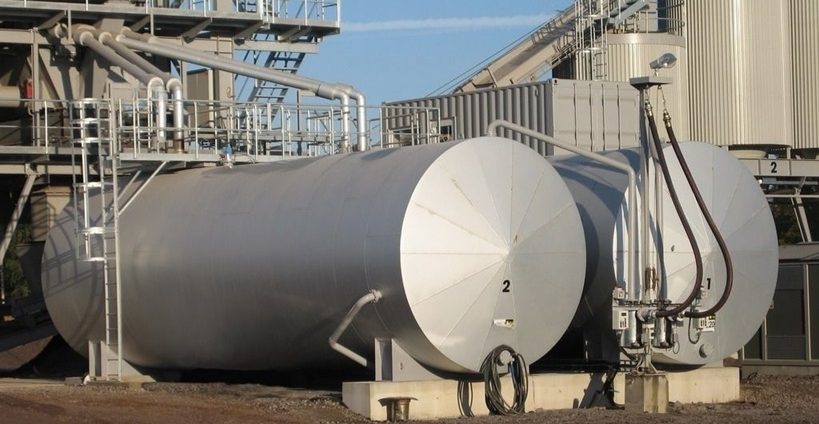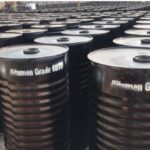
How is Viscosity Bitumen Manufactured? – Process, Grades & Industrial Applications
How is Viscosity Bitumen Manufactured: Viscosity Grade Bitumen (VG Bitumen) is a specially classified bitumen used predominantly in paving and road construction. Unlike penetration grade bitumen, VG Bitumen is categorized based on its viscosity (resistance to flow), offering greater consistency in performance. Understanding its manufacturing process is crucial for civil engineers, procurement managers, and asphalt specialists aiming to optimize road durability in varying climates.
This blog will delve into the detailed process of manufacturing VG Bitumen, its properties, applications, and why Peak Universal Business is the ideal supplier for this essential product.
What is Viscosity Grade Bitumen?
Viscosity Grade Bitumen is a type of paving-grade bitumen whose classification is based on its measured viscosity at 60°C and 135°C, rather than its penetration value. This shift in classification enhances its performance predictability in hot and cold climates, offering better control over mix designs and compaction behavior during paving.
Key Properties of VG Bitumen
- Viscosity: Measured at 60°C (140°F) and 135°C (275°F) to ensure consistent performance.
- Temperature Sensitivity: VG Bitumen is less sensitive to temperature variations, providing more stable performance across different climates.
- Penetration: Although not the primary classification method, penetration values are still important for specific applications.
- Softening Point: The temperature at which bitumen softens, indicating its resistance to heat.
🏭 How is Viscosity Bitumen Manufactured?
1. Crude Oil Distillation
The Viscosity Grade Bitumen Process begins with the selection of appropriate crude oil. The quality and type of crude oil significantly impact the properties of the final bitumen product. Crude oil suitable for bitumen production is typically rich in heavy hydrocarbons.
The selected crude oil undergoes a distillation process in a refinery. This process separates the crude oil into different fractions based on their boiling points. The primary fractions include:
Light Distillates: Such as gasoline and naphtha.
Middle Distillates: Such as diesel and kerosene.
Heavy Distillates: Which include the heavy residue that will be further processed into bitumen.
The heavy residue, also known as vacuum residue, is the key component used for bitumen production.
The production of VG Bitumen begins with the atmospheric and vacuum distillation of selected crude oils:
-
Atmospheric Distillation: Removes light fractions like gasoline, kerosene, and diesel.
-
Vacuum Distillation: Extracts heavier hydrocarbons, leaving behind the vacuum residue, which serves as the base for bitumen.
To further refine the heavy residue, it undergoes vacuum distillation. In this process, the residue is heated under reduced pressure, which allows for the separation of lighter hydrocarbons from the heavier components. This step is crucial as it produces a material with the desired viscosity and other properties necessary for VG Bitumen.
2. Air Blowing (Oxidation)
The vacuum residue is then subjected to an air blowing process. In this stage, air is blown through the heated residue, causing a chemical reaction that modifies the structure of the bitumen. This process increases the viscosity and softening point of the bitumen, making it suitable for various applications.
The vacuum residue is subjected to air blowing in a reactor to control the softening point and viscosity:
-
Heated air is blown through the residue at 220–260°C.
-
Chemical reactions (oxidation and polymerization) increase the viscosity and elasticity.
-
Duration and intensity of blowing determine the final VG grade.
There are two main types of air blowing processes:
Catalytic Air Blowing:
Uses catalysts to accelerate the chemical reactions, producing bitumen with specific properties.
Non-Catalytic Air Blowing:
Relies solely on the chemical reactions between the air and the heated residue.
The choice between these methods depends on the desired properties of the final VG Bitumen product.
3. Blending and Quality Control
Post-oxidation, the bitumen is:
-
Blended to meet VG grade specifications.
-
Tested for viscosity, softening point, and ductility.
-
Stored in insulated tanks ready for packaging or bulk transport.
To achieve the precise specifications required for VG Bitumen, blending is often necessary. This involves mixing different grades of bitumen or adding specific additives to modify the properties. Blending ensures that the final product meets the required viscosity, penetration, and softening point values.
Quality control is a critical part of the VG Bitumen manufacturing process. Throughout the production stages, samples are taken and tested to ensure they meet the required standards. Key tests include:
- Viscosity Testing: Measures the resistance to flow at specific temperatures.
- Penetration Testing: Determines the hardness of the bitumen.
- Softening Point Testing: Establishes the temperature at which bitumen softens.
- Ductility Testing: Measures the elongation before breaking.
These tests ensure that the VG Bitumen produced meets industry standards and is suitable for its intended applications.
📊 Technical Specifications of VG Bitumen (IS 73:2013 Standard)
| VG Grade | Viscosity @ 60°C (Poise) | Viscosity @ 135°C (cSt) | Penetration (dmm) | Softening Point (°C) | Ductility (cm @ 25°C) |
|---|---|---|---|---|---|
| VG-10 | 800–1200 | Min. 250 | 80–100 | Min. 40 | Min. 75 |
| VG-20 | 1600–2400 | Min. 300 | 60–80 | Min. 45 | Min. 50 |
| VG-30 | 2400–3600 | Min. 350 | 50–70 | Min. 47 | Min. 40 |
| VG-40 | 3200–4800 | Min. 400 | 40–60 | Min. 50 | Min. 25 |
🏗️ Applications of VG Bitumen
VG Bitumen is used in a variety of applications, primarily in the construction and maintenance of roads. Its stable viscosity and reliable performance make it ideal for these uses.
1. Road Construction
VG Bitumen is extensively used in road construction due to its superior properties. It provides a durable and flexible pavement surface that can withstand heavy traffic and varying weather conditions.
Uses:
Asphalt Concrete:
VG Bitumen is mixed with aggregates to form asphalt concrete, used for constructing roads, highways, and runways.
Bituminous Macadam:
A type of road surface made from VG Bitumen and coarse aggregates.
Surface Dressing:
VG Bitumen is sprayed onto road surfaces, followed by the application of aggregates to improve skid resistance and seal the surface.
2. Road Maintenance
Maintaining roads is crucial for ensuring safety and prolonging the lifespan of the pavement. VG Bitumen is used in various maintenance techniques to repair and rejuvenate road surfaces.
Uses:
Pothole Repair:
VG Bitumen is used to fill and seal potholes, preventing further damage and ensuring a smooth surface.
Crack Sealing:
It is used to seal cracks in the pavement, preventing water ingress and subsequent damage.
Overlaying:
A layer of VG Bitumen is applied over existing road surfaces to restore their condition and extend their life.
🏗️ Industrial Applications of Viscosity Bitumen
🛣️ Highway and Expressway Construction
VG-30 and VG-40 are extensively used for heavy-traffic roads, providing high resistance to rutting, fatigue, and thermal cracking.
🌡️ Extreme Climate Paving
VG grades offer enhanced thermal stability, making them suitable for both hot (VG-40) and cold (VG-10) regions, improving road longevity.
🏗️ Bituminous Mix Design
VG Bitumen is preferred in Dense Bituminous Macadam (DBM) and Bituminous Concrete (BC) mixes, offering better mix control and compaction.
🧪 Polymer Modified Bitumen (PMB) Base
VG Bitumen is used as the base binder for manufacturing PMB and Crumb Rubber Modified Bitumen (CRMB), enabling advanced pavement solutions.
Beyond road construction and maintenance, VG Bitumen is also used in several industrial applications due to its adhesive and waterproofing properties.
Roofing Felt: VG Bitumen is used in the production of roofing felt, providing a waterproof barrier for buildings.
Pipe Coating: It is used to coat pipelines, protecting them from corrosion and environmental damage.
Insulation: VG Bitumen is used as an insulating material in various industrial applications.
✅ Key Benefits of VG Bitumen
-
🔁 Stable Performance Across Climates: Better control over temperature susceptibility.
-
🧪 Test-Based Classification: Reduced ambiguity compared to penetration grades.
-
🔧 Improved Mix Consistency: Easier to design asphalt mixes with predictable outcomes.
-
🔥 Higher Resistance to Deformation: Especially in high-traffic urban highways.
-
📉 Reduced Maintenance Costs: Longer lifespan means lower lifecycle costs.
🔍 VG Bitumen vs Penetration Grade Bitumen
| Property | Viscosity Grade Bitumen | Penetration Grade Bitumen |
|---|---|---|
| Classification Basis | Viscosity | Penetration depth |
| Performance Predictability | High | Moderate |
| Climate Suitability | All climates | Limited |
| Mix Design Control | Excellent | Less flexible |
| Standardization | IS 73:2013 | IS 73:1992 |
Why Choose Peak Universal Business as Your VG Bitumen Supplier?
When it comes to sourcing high-quality VG Bitumen, Peak Universal Business stands out as the preferred supplier. Here are some reasons why choose PUB (VG Bitumen Supplier) :
1. Quality Assurance: Peak Universal Business ensures that their VG Bitumen meets the highest quality standards, providing reliable and consistent materials for your projects.
2. Competitive Pricing: They offer competitive prices without compromising on quality, ensuring you get the best value for your investment.
3. Reliable Supply Chain: With a robust supply chain, Peak Universal Business guarantees timely delivery, ensuring your projects proceed without delay.
4. Expertise and Support: Their team of experts is always available to provide guidance and support, helping you select the right products for your specific needs.
5. Customer Satisfaction: Committed to customer satisfaction, Peak Universal Business offers exceptional service and support, ensuring a seamless procurement experience.
❓ FAQs about Viscosity Bitumen
❓ What is the difference between VG-30 and VG-40 Bitumen?
VG-30 is suited for moderate to heavy traffic roads, while VG-40 is ideal for highways with extremely heavy traffic and high temperatures due to its higher viscosity.
❓ How is VG Bitumen tested?
It is tested for viscosity at 60°C and 135°C, softening point, penetration, and ductility under IS 73:2013 standards.
❓ Why is viscosity better than penetration as a grading system?
Viscosity grading provides a better measure of binder behavior under actual pavement temperatures, improving durability and performance prediction.
❓ Is VG Bitumen suitable for polymer modification?
Yes, VG Bitumen, particularly VG-30, is often used as a base for manufacturing PMB and CRMB.
❓ Can VG Bitumen be used in rural roads?
VG-10 and VG-20 are appropriate for rural or low-traffic roads where flexibility and workability are more important than stiffness.
📌 Conclusion- How is Viscosity Bitumen Manufactured?
The manufacturing of Viscosity Grade Bitumen involves precise distillation, oxidation, and blending to achieve superior performance standards. Its viscosity-based classification ensures greater reliability in road paving, enabling engineers to tailor pavement designs to specific climate and traffic conditions. From national highways to flexible rural roads, VG Bitumen is indispensable in modern infrastructure development.
Understanding the detailed process of How Viscosity Bitumen Manufactured and its applications can help you make informed decisions when sourcing this vital material.
By choosing Peak Universal Business as your supplier, you can be confident in receiving high-quality VG Bitumen, competitive pricing, reliable delivery, and expert support.
Whether you need VG Bitumen for road construction, maintenance, or industrial applications, Peak Universal Business has the expertise and resources to meet your needs. Experience the difference in quality and service by partnering with Peak Universal Business for your VG Bitumen requirements.
📣 Call to Peak Universal Business
🔍 Looking for a Reliable Supplier of Viscosity Grade Bitumen?
👉 Need high-performance VG Bitumen for your next project?
Work with a certified supplier for consistent quality and timely delivery.
📌 Contact Peak Universal Business For:
-
VG-10, VG-20, VG-30, VG-40 in bulk or drums
-
Third-party test certificates (TPCs)
-
Custom packaging and export documentation
🔹 Request a Quote | 🔹 Download Specs | 🔹 Speak to a Bitumen Expert
📧 Email: [email protected]
📞 Phone: +971 4 878 2031
🌐 Visit: PUBLtd.Viscosity Bitumen
If You have any other Query or Question you want to ask, Please don’t hesitate to Contact Us.
You can Read More about our products Here:
- 0 comment





Leave a Reply